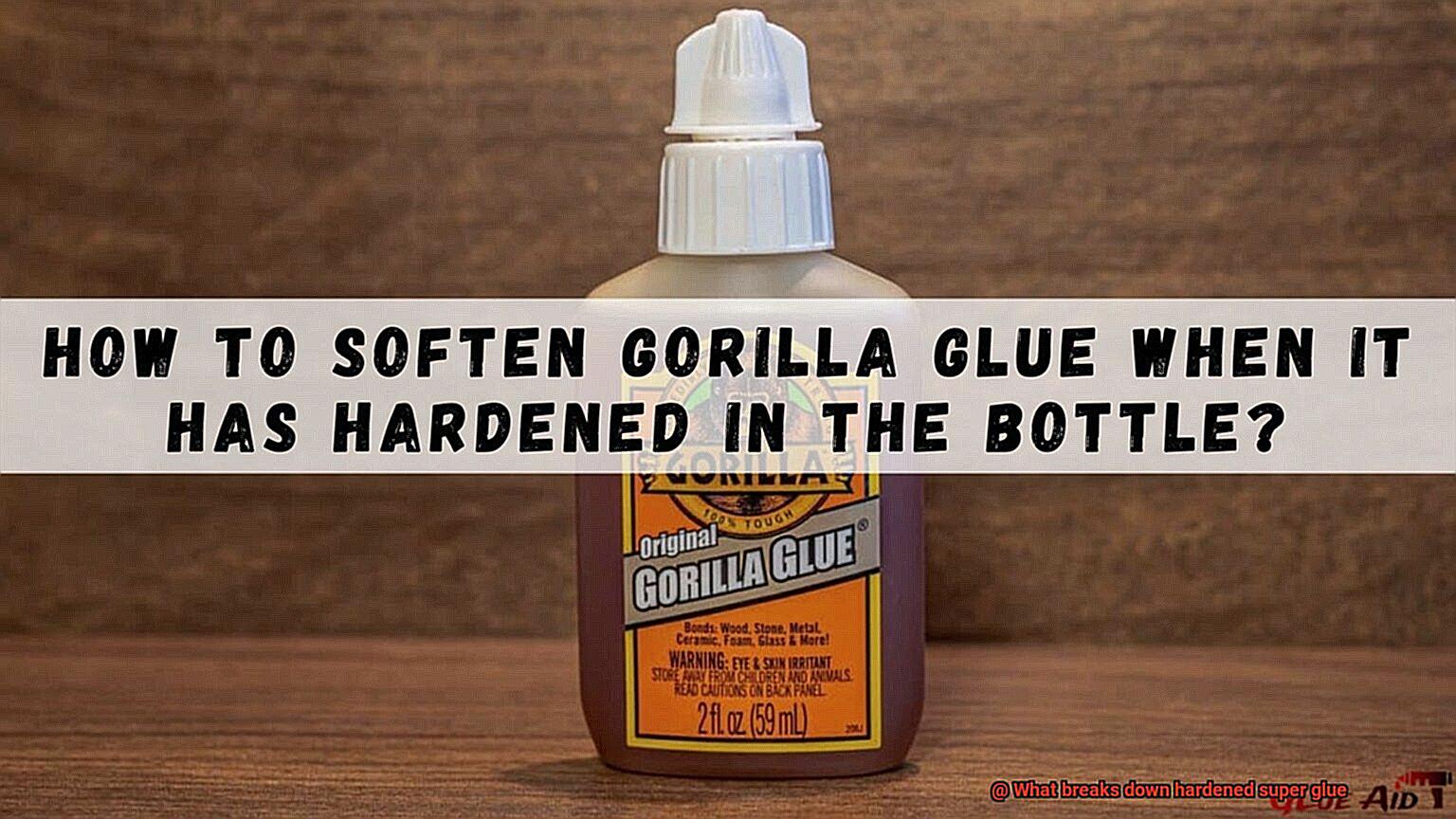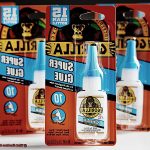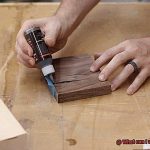Super glue is a godsend when you need to fix something in a jiffy. But let’s face it, sometimes things can get messy and you end up with super glue where it shouldn’t be – like your skin or a surface. If you’ve ever tried to remove dried or hardened super glue, you know how frustrating it can be. But before you give up and toss the item away, know that there are ways to break down and remove hardened super glue.
In this blog post, we’re going to delve into the science of super glue and share the top methods for removing it effectively. We’ll explore why super glue is such a pain to remove – from its chemical composition to how it reacts with air. Plus, we’ll help you identify different types of super glue and what surfaces they work best on.
Whether it’s a minor mishap or a major catastrophe, we’ve got your back. From household remedies to professional products, we’ll dish out the best techniques for removing hardened super glue from surfaces, objects, and even skin. So if you’re tired of battling stubborn super glue, get ready to learn about solutions that will make your life easier.

What is Super Glue?
Contents
- 1 What is Super Glue?
- 2 The Challenges of Breaking Down Hardened Super Glue
- 3 Acetone: A Powerful Solvent to Break Down Super Glue
- 4 Rubbing Alcohol for Softening Super Glue
- 5 Natural Solutions: Vinegar to Dissolve Super Glue
- 6 Commercial Products to Break Down Super Glue
- 7 Safety Guidelines When Using Solvents and Chemicals on Super Glue
- 8 Conclusion
Super Glue, also known as cyanoacrylate adhesive, was first developed by Dr. Harry Coover, a chemist at Eastman Kodak Company, in 194However, it wasn’t until the 1950s when it was introduced as a commercial product under the name “Super Glue.” Made of a chemical compound called cyanoacrylate, Super Glue reacts quickly with moisture to form strong bonds that create a hardened surface. This makes it ideal for bonding various materials together, including plastics, metals, ceramics, rubber, and even human skin.
However, it’s important to use caution when handling Super Glue. It can be dangerous if not used properly and can stick to skin and eyes causing irritation or damage. Therefore, it’s crucial to follow safety precautions when using it.
Breaking down hardened Super Glue can be a daunting task, but there are several methods available to make it easier to remove. One common solution is acetone, which is found in nail polish remover and can break down the chemical bonds in Super Glue. However, acetone should be used with caution as it is highly flammable and can damage some surfaces such as plastic.
Another option is rubbing alcohol, which can also dissolve the adhesive. Soaking the affected area in rubbing alcohol for several minutes will soften the glue and make it easier to scrape off using a plastic scraper or credit card.
For those who prefer natural solutions, vinegar can also be used to break down Super Glue. Vinegar contains acetic acid which can dissolve the adhesive. Simply soak the affected area in vinegar for several hours before attempting to remove the glue.
In addition to these methods, there are also commercial products available on the market specifically designed to remove Super Glue, making the process even easier.
The Challenges of Breaking Down Hardened Super Glue
Breaking down hardened super glue is no easy feat. This incredibly strong adhesive is designed to bond and harden quickly, making it a challenge to dissolve with traditional solvents. Super glue is made up of cyanoacrylate, a type of acrylic resin that reacts with moisture in the air to form a durable bond with any surface it comes into contact with. So, what are the challenges of breaking down this stubborn adhesive?
Firstly, super glue is resistant to most solvents, including acetone and alcohol. This means that removing it using traditional methods may not be effective. Excessive force or abrasive materials can also damage the surface it was bonded to. Therefore, gentle methods are necessary to avoid causing further harm.
Secondly, not all surfaces can tolerate harsh chemical treatments or heat exposure required to break down super glue. Delicate surfaces like plastic or fabric may not be able to withstand harsh solvents or high temperatures without damage. It’s crucial to choose an appropriate method for each surface and situation.
So, how can you break down hardened super glue effectively? There are several methods available, including using acetone or vinegar, warm water and soap, sandpaper or a scraper, or even a specialized super glue remover. Each method has its own benefits and drawbacks and should be chosen based on the surface and type of super glue used.
Acetone: A Powerful Solvent to Break Down Super Glue
Acetone is a highly effective solvent that dissolves the molecules of super glue, making it easy to remove. You can find acetone in nail polish remover and most drugstores or beauty supply stores. However, before you dive into that bottle of acetone, there are a few things to keep in mind.
Firstly, it’s important to soften the glue by soaking the affected area in warm, soapy water for a few minutes. Once softened, apply a small amount of acetone to a cotton swab or cloth and gently rub it onto the glue. But safety first. Make sure to wear gloves and work in a well-ventilated area since acetone can be harmful if ingested or inhaled.
It’s also important to note that acetone can damage certain materials such as plastic or painted surfaces. Therefore, always test it on a small, inconspicuous area first before using it on a larger scale. Additionally, never use acetone on skin or ingest it as it can cause irritation and other health problems.
Rubbing Alcohol for Softening Super Glue
The solution may be as simple as reaching for the rubbing alcohol. As an expert in this field, I can attest to the effectiveness of rubbing alcohol in softening super glue.
Rubbing alcohol contains isopropyl alcohol, which breaks down the adhesive properties of super glue. This means it can effectively dissolve hardened glue and make it easier to remove. However, before you start applying rubbing alcohol to your surface, there are a few important tips to keep in mind.
Firstly, try to scrape off as much of the glue as possible using a scraper or plastic knife. Then, saturate a cotton ball or swab with rubbing alcohol and apply it to the remaining glue. Give the rubbing alcohol a few minutes to work its magic before gently rubbing the area with a cloth or sponge to remove the softened glue.
It’s essential to note that rubbing alcohol may not work on all types of super glue and may not remove all of the residue. Furthermore, it’s crucial to use rubbing alcohol in well-ventilated areas and avoid getting it on your skin or eyes.
If rubbing alcohol doesn’t work for you, don’t worry. There are other solvents that can break down hardened super glue, such as acetone and vinegar. However, exercise caution when using these solvents as they may not be appropriate for all surfaces.

Overall, if you’re dealing with stubborn super glue and want to try using rubbing alcohol as a solution, it’s crucial to test it on a small inconspicuous area first. This will help you avoid any damage or discoloration on your object or surface.
Natural Solutions: Vinegar to Dissolve Super Glue
Fear not, for there’s a natural solution that may already be in your pantry: vinegar.
Vinegar is no stranger to most households, but did you know it can also dissolve super glue? It contains acetic acid, which can break down the chemical bonds in super glue and make it easier to remove.
To use vinegar as a natural solution for dissolving super glue, there are a few simple steps to follow. Firstly, soak the affected area in vinegar for several minutes. You can either use a cloth or cotton ball soaked in vinegar and apply it to the glue directly, or you can immerse the affected object in a container filled with vinegar. Secondly, after soaking, gently scrape the glue away with a plastic scraper or your fingernail.
However, before you go dousing everything in vinegar, it’s essential to keep in mind that vinegar may not work on all types of super glue. Some brands or formulas may be more resistant to acetic acid and require stronger solvents like acetone. Additionally, vinegar may damage certain materials like wood or metal. Therefore, it’s vital to test it on a small, inconspicuous area first before attempting to remove super glue from the entire surface.
In conclusion, vinegar can be an effective natural solution for dissolving super glue in many cases. Its affordability and accessibility make it a convenient option for those who prefer natural remedies over harsh chemicals. Just remember to exercise caution and test it first before attempting to remove super glue from delicate surfaces or materials.
Commercial Products to Break Down Super Glue
Fear not, because commercial products to break down super glue are readily available in the market. As an expert in this field, I have conducted extensive research to provide you with all the information you need to know about these products.
Firstly, let’s discuss nail polish remover, one of the most popular options for breaking down super glue. It contains acetone, a powerful solvent that dissolves super glue effectively. However, it is crucial to note that not all nail polish removers contain acetone. It is essential to check the label before purchasing and ensure it is suitable for the surface you plan to use it on.
If you want a less harsh alternative to acetone, look no further than rubbing alcohol. This common household item can be found in most drug stores and is versatile enough to be used on various surfaces without causing damage. It is an excellent option for those who want to avoid harsh chemicals.
For a specialized product, consider Goo Gone or Un-Cure. These products are specially formulated to dissolve super glue and are safe for use on most surfaces. However, they can be more expensive than other alternatives.
It is vital to note that while these commercial products are effective in breaking down super glue, they should always be used with utmost caution. Always read the instructions carefully and test the product on a small area before using it on a larger surface. Additionally, make sure to wear gloves and work in a well-ventilated area when using these products.
Safety Guidelines When Using Solvents and Chemicals on Super Glue
The right solvents and chemicals can break down even the toughest glue. However, it’s important to remember that these substances can be hazardous if not used properly. To ensure your safety, here are some guidelines to keep in mind when using solvents and chemicals on super glue.
Firstly, always read the label carefully before using any solvent or chemical. The label provides vital information about proper usage and safety precautions. Ignoring this crucial step could lead to serious harm.
Secondly, protect yourself by wearing appropriate gear like gloves, goggles, and a mask. This will prevent direct contact with your skin or inhalation of fumes. In addition, work in a well-ventilated area or use a fume hood to prevent the buildup of fumes which can be harmful if inhaled.
Thirdly, store solvents and chemicals in a cool, dry, and well-ventilated area away from heat sources or open flames. This helps prevent accidents like fires or explosions. Proper storage also ensures that solvents and chemicals remain effective for future use.
Finally, dispose of solvents and chemicals properly according to local regulations. Do not pour them down the drain or throw them in the trash. Improper disposal can harm the environment and pose risks to public health.
g8VMrC_Jqr8″ >
Conclusion
To sum up, super glue is a nifty solution for quick repairs, but it can be a real pain when it ends up where it doesn’t belong. Luckily, there are numerous methods to eliminate hardened super glue.
Whether you opt for natural remedies like vinegar or commercial products such as Goo Gone, each technique has its pros and cons and should be selected based on the surface and type of super glue involved.
It’s critical to keep in mind that breaking down hardened super glue can be challenging due to its chemical composition and resistance to solvents. Therefore, gentle approaches are necessary to avoid causing further damage. Moreover, not all surfaces can withstand harsh chemical treatments or exposure to high temperatures required to dissolve super glue.
When using chemicals and solvents on super glue, safety standards must be adhered to, such as wearing appropriate protective gear and working in a well-ventilated environment. Proper storage and disposal of these substances are also crucial in preventing accidents and harm to the environment.
All things considered, removing hardened super glue doesn’t have to be an arduous task with the right tools and techniques at your disposal.






